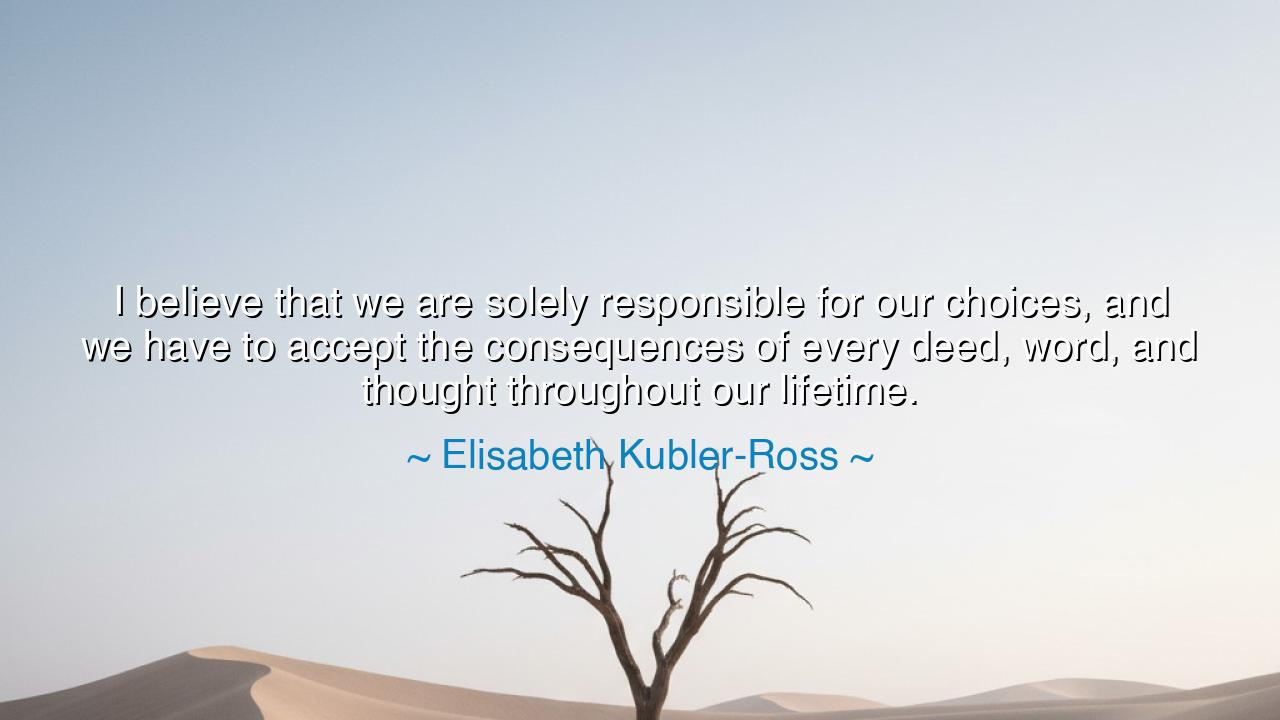
I believe that we are solely responsible for our choices, and we
I believe that we are solely responsible for our choices, and we have to accept the consequences of every deed, word, and thought throughout our lifetime.






Responsibility is the sacred burden of all who walk upon this earth. When Elisabeth Kübler-Ross declared, “I believe that we are solely responsible for our choices, and we have to accept the consequences of every deed, word, and thought throughout our lifetime,” she spoke a truth as eternal as the mountains. Each choice we make shapes the path beneath our feet, and no man or woman can escape the consequences of their actions. Even when fate deals its blows, our response to it is our own, and therein lies the measure of our soul.
This teaching springs from ancient wisdom. The great sages of India spoke of karma, the law of cause and effect, declaring that every thought, every whisper, every hidden intention casts ripples through the universe. The Stoic philosophers of Rome, like Marcus Aurelius, echoed this truth when they taught that while we cannot control all events, we are always masters of our response. Kübler-Ross, a pioneer who studied death and dying, understood that life’s ultimate peace comes not from avoiding mistakes but from accepting accountability for them and learning from their weight.
History bears witness to this truth through countless lives. Consider Nelson Mandela, who faced decades of unjust imprisonment. Though the world dealt him cruelty, he chose forgiveness over vengeance when he emerged free. In doing so, he shaped the destiny of his nation and embodied Kübler-Ross’s teaching. Mandela accepted that while he could not undo the past, he was responsible for how he met the present. His deeds and words became a beacon of healing, proving that noble choices can transform even the deepest suffering into victory.
Yet many falter because they deny their part in their own suffering. A man who blames others for his misfortunes will never grow, for he has surrendered his power. Kübler-Ross’s words remind us that even our thoughts carry weight. To harbor hatred, envy, or despair is to plant seeds that may one day grow into actions we regret. Likewise, thoughts of compassion and courage shape deeds of greatness. Thus, true mastery begins not with the tongue or the hand, but with the mind.
This truth is not meant to burden us, but to empower us. If we are responsible for our lives, then we are also capable of reshaping them. No mistake need define us forever, for each moment offers a new choice. By embracing responsibility, we reclaim the role of architect rather than victim, sculpting our destiny through conscious action.
Let this teaching be passed to future generations: life is not a chain of accidents but a tapestry woven from our choices. To live with integrity is to face the consequences of our deeds with courage and humility. In this way, even our failures become teachers, and the story of our life becomes a testament to the strength of a soul that accepts its burden and walks forward with unwavering resolve.






AAdministratorAdministrator
Welcome, honored guests. Please leave a comment, we will respond soon